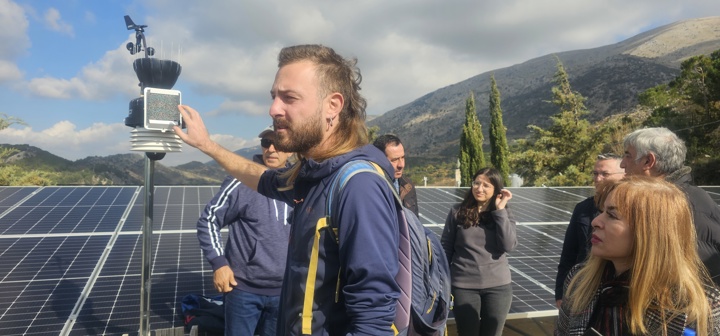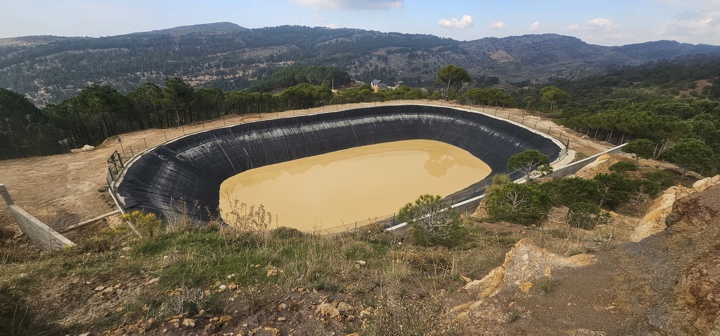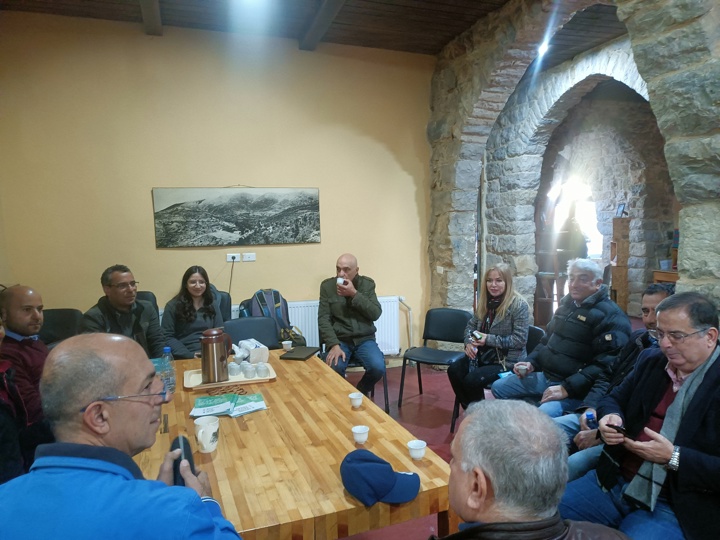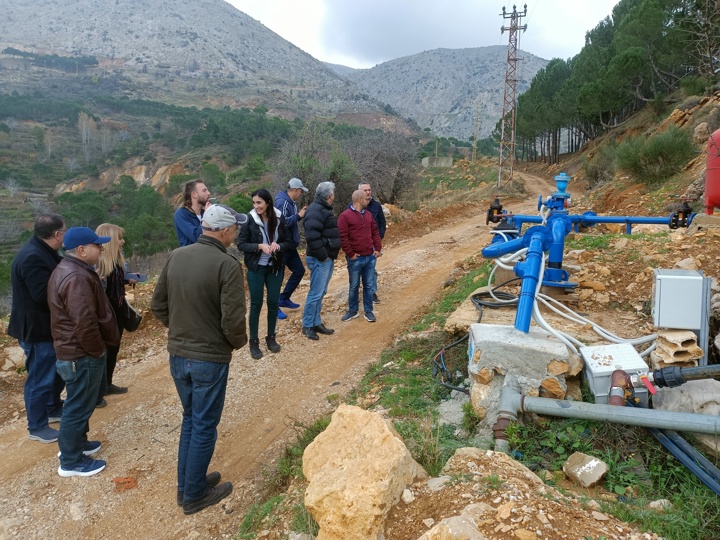WEFE Nexus policy dialogue in Lebanon: Exploring the Nexus in practice
Nine representatives from Lebanese institutions related to managing water and energy resources, agriculture/food security, and environmental protection participated in a meeting and field visit organized by the Global Water Partnership-Mediterranean on December 18, 2023.
The group visited the Shouf region of Lebanon as part of the Water-Energy-Food-Ecosystems (WEFE) Nexus Policy Dialogue conducted in the country by GWP-Med under the GEF UNEP/MAP MedProgramme. The objective was to introduce participants to practical examples of WEFE Nexus solutions that are applied in the country.
The initiative aimed to encourage dialogue and facilitate knowledge exchange among various institutions. It also provided an opportunity to explore the advantages of implementing these solutions and to promote discussions on their replication and upscaling in Lebanon.

The Al-Shouf Cedar Nature Reserve/Shouf Biosphere Reserve (SBR), the largest of Lebanon's nature reserves, is crucial in stimulating local sustainable economic development while safeguarding the natural and cultural heritage it depends upon. This is accomplished through various initiatives and projects implemented in the region under its supervision. Participants visited the Swat project, the Water, Sanitation and Conservation (WSC) project, and the MINARET I project, all of which apply Nexus-related solutions, benefitting the local communities and contributing to sustainable natural resources management.
The group first visited the Al Shouf Cedar Society (ACS) premises, where Dr. Nizar Hani, General Manager of Al-Shouf Cedar Nature Reserve / Shouf Biosphere Reserve (SBR), welcomed participants. He provided an overview of numerous initiatives implemented in the area, which embrace the principles of system-thinking and circular economy and yield positive and synergistic outcomes that benefit various Nexus sectors simultaneously. These projects promote customized solutions tackling specific local needs and have a high level of community engagement.

The participants were then directed towards three different projects. The first one is the SWat project, which aims to tackle water scarcity and protect freshwater resources through a remote-controlled irrigation system. The second project is the WSC project, which seeks to reduce the environmental impact caused by wastewater treatment plants in the Barouk River watershed by implementing a wastewater sludge management system. The third project is the MINARET I project, which implements the WEFE Nexus approach to provide benefits for both nature and local farmers. They were highly impressed by the innovative approaches and outcomes, which demonstrate how comprehensive and strategic planning, combined with modern technologies, can effectively address trade-offs across different sectors while simultaneously generating socioeconomic and environmental advantages.
Eng Mona Fakih, Director of Water – Ministry of Energy and Water, stated: "Today was very fruitful; we have seen the Nexus on the ground because usually, we talk about the Nexus in theory, so here, we saw it. It can be a starting point to elaborate and integrate it into our strategies and move from small to bigger projects. We have also seen the biodiversity in the protected areas, and the most important was that we had a variety of people from the Ministry of Agriculture, Ministry of Environment, and CNRS, so most of the relevant stakeholders were with us, which is a good start to make dialogue together and benefit from the experience of each other. "
The joining institutions are members of the newly formed WEFE Inter-Ministerial Group, which is led by the Lebanese Ministry of Energy and Water and facilitated by GWP-Med. The Group facilitates the collective engagement of relevant institutions to prioritize common solutions. These institutions offer valuable guidance to the WEFE-Inter-Ministerial Group for the implementation of the WEFE Nexus Policy Dialogue and related activities in Lebanon.
GWP-Med has been implementing activities in Lebanon since 2022 in the framework of the GEF UNEP/MAP MedProgramme, to assess the opportunities offered by the Water-Energy-Food-Ecosystems (WEFE) Nexus approach. These initiatives offer participants a chance to engage in constructive dialogue and mutual learning, and promote collaboration among projects. Additionally, the replication of best practices in other regions of Lebanon is encouraged, ultimately contributing to enhancing the country’s natural resources security.

The event was successfully organized thanks to the kind support of:
- Al Shouf Cedar Society (ACS), UniTrento/Istituto OIKOS, Association for Community and Environment (ACE), MORES s.a.r.l and Jdeidet El Chouf municipality, through its mayor Eng. Hisham Fatairy.
and the participation of the following experts from institutions, organizations and local administrations, namely:
Ms. Mona Fakih and Mr. Mufid Duhayni (Ministry of Energy and Water), Mr. Ramzi Saliba and Mr. Antoine Zoghby (Beirut and Mount Lebanon Water Establishment), Mr. Kassem Khalifeh (South Lebanon Water Establishment), Mr. Nassim Abou Hamad (Litani River Authority), Mr. Hussein Nasrallah (Ministry of Agriculture), Mr. Najib Abi Chedid (Ministry of Environment), Mr. Ghaleb Faour (National Council of Scientific Research), Mr. Nizar Hani (Al-Shouf Cedar Nature Reserve / Shouf Biosphere Reserve (SBR), Ms. Line Boustani and Ms. Hanan Hassan (ACS), Mr. Nicola d'Alberton (UniTrento/SWat project), Ms. Soumaya Ayadi (ACE), Ms. Joane Saade (MORES s.a.r.l), Eng. Hisham Fatairy, Mayor of Jdeidet El Chouf municipality and Mr. Gazi Jabber.
____________________________________________________________________________________________________
1. The SWat project is funded by the European Union and the Swedish Postcode Foundation and implemented by Istituto Oikos in partnership with Al-Shouf Cedar Society (ACS), University of Trento (UNITRENTO) and the Association for Community and Environment (ACE). For more information: https://www.istituto-oikos.org/projects/saving-water-growing-crops-lebanon
2. The Water, Sanitation, and Conservation Project is funded by the United States Agency for International Development (USAID) and implemented by DAI Global, LLC, and Al Shouf Cedar Society (ACS) in close collaboration with the environmental consultancy firm MORES s.a.r.l. (Management Of Resources and Environmental Solutions).
3. The MINART I project was funded by Sweden and implemented by Royal Scientific Society, IUCN, and Horizons For Green Development. For more information: https://minaretproject.com/minaret-i/
About the project
The Mediterranean Sea Programme (MedProgramme): Enhancing Environmental Security (GEF ID 9607) is a Global Environment Facility (GEF) regional Multi-Focal Area Programmatic Approach, implemented in Albania, Algeria, Bosnia and Herzegovina, Egypt, Lebanon, Libya, Montenegro, Morocco, Tunisia, and Turkey. UNEP/Mediterranean Action Plan (MAP) is the leading executing Agency; the GEF Implementing Agencies are UNEP and the European Bank for Reconstruction and Development (EBRD) and the executing partners are UNESCO/IHP, European Investment Bank (EIB), IUCN Med, GWP Med, WWF Med, Plan Bleu, PAP/RAC, SCP/RAC and SPA/RAC.
The Programme aims to accelerate the Implementation of agreed-upon priority actions to reduce the major transboundary environmental stresses affecting the Mediterranean Sea and its coastal areas while strengthening climate resilience and water security and improving the health and livelihoods of coastal populations.
For more information, please contact Maria Livanou, Senior Communications Officer, GWP-Med ( maria.livanou@gwpmed.org), and visit the project page on iwlearn.net.


























